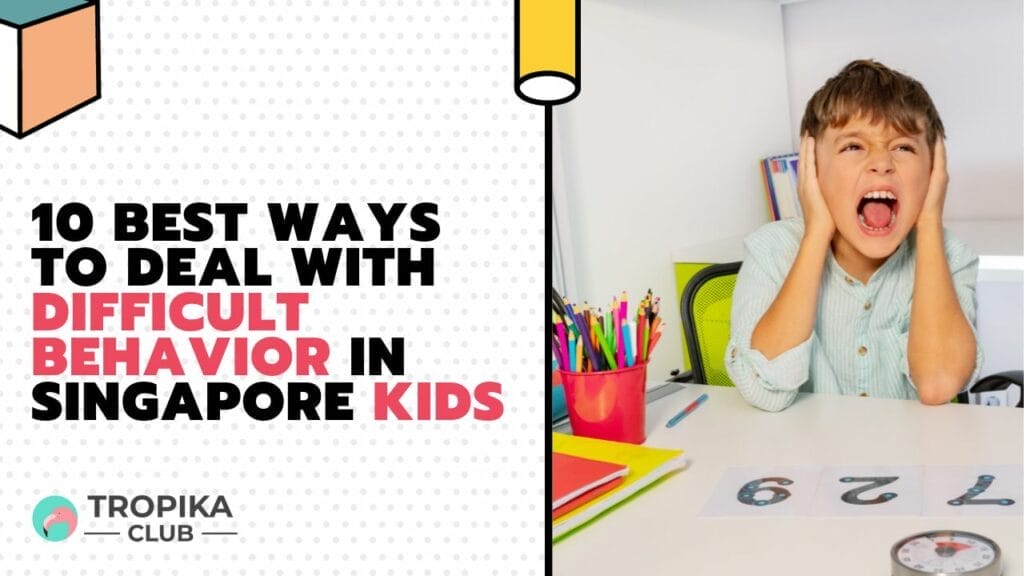10 Best Ways to Deal with Difficult Behavior in Singapore Kids

No Time to Read? Here’s a Snappy Summary of This Article
- Positive Reinforcement: Utilize rewards and praise to encourage desired behavior, fostering a positive environment for learning and growth.
- Clear Boundaries: Establish consistent rules to provide structure and stability, aiding in managing challenging behaviors effectively.
- Active Listening: Engage kids by attentively listening to their concerns, helping them feel valued and understood.
- Empathy and Understanding: Connect with children by empathizing with their emotions, fostering a supportive and compassionate relationship.
- Effective Communication: Use clear, concise language and non-verbal cues to convey expectations and consequences for actions.
- Patience and Consistency: Maintain a calm demeanor and enforce rules consistently to help kids understand boundaries and expectations.
Table of Contents
- No Time to Read? Here’s a Snappy Summary of This Article
- 1. Understand the Root Cause
- 2. Set Clear Boundaries
- 3. Use Positive Reinforcement
- 4. Be a Role Model
- 5. Consistent Discipline
- 6. Open Communication
- 7. Time-Outs and Cool-Downs
- 8. Seek Professional Help
- 9. Involve Them in Decision Making
- 10. Show Unconditional Love
- Meanwhile, Check Out Tropika Club’s Ecosystem of Websites
Introduction
Parenting is a rollercoaster ride, filled with ups and downs. And if you’re a parent in Singapore, you know that dealing with difficult behavior in children can be a real challenge. Whether it’s tantrums, defiance, or just plain stubbornness, it’s crucial to address these issues effectively. This article aims to provide you with a comprehensive guide, featuring 10 actionable ways to deal with difficult behavior in Singaporean kids. So, let’s get started!

1. Understand the Root Cause
Understanding the root cause of your child’s difficult behavior is the first step towards effective management. Often, children act out due to unmet needs or emotional distress. It could be due to academic pressure, social issues, or even lack of attention at home. In Singapore, where academic excellence is highly valued, children may feel overwhelmed and act out as a coping mechanism. Take time to talk to your child and understand what’s really going on.

2. Set Clear Boundaries
Setting clear boundaries is essential for any child’s development. In a society like Singapore, where discipline and order are highly regarded, it’s crucial to instill these values in your children. Make sure to establish rules and consistently enforce them. This provides a structure that helps children feel secure and understand the limits of acceptable behavior.
/GettyImages-509603703-58589a425f9b586e0244d27a.jpg)
3. Use Positive Reinforcement
Positive reinforcement can go a long way in shaping a child’s behavior. Instead of focusing on punishments, reward good behavior with praise, treats, or extra playtime. This approach is particularly effective in Singapore, where children often face high levels of stress and pressure. Positive reinforcement can serve as a motivational boost, encouraging better behavior.

4. Be a Role Model
Children often mimic the behavior of adults around them. Be a role model by exhibiting the kind of behavior you want to see in your child. In Singapore, where family values are strong, parents play a significant role in shaping a child’s character. Show them respect, kindness, and empathy, and they are likely to reciprocate.

5. Consistent Discipline
Consistency is key when it comes to discipline. Mixed signals can confuse children and make it harder to enforce rules. In Singapore, where there’s a mix of traditional and modern parenting styles, it’s important to be consistent in your approach to ensure your child knows what to expect.

6. Open Communication
Open and honest communication is crucial for understanding and resolving behavioral issues. Create a safe space where your child feels comfortable sharing their thoughts and feelings. This is especially important in Singapore, where the culture may sometimes discourage open emotional expression.
_
Read Also:
Getting your dream job during COVID-19
_

7. Time-Outs and Cool-Downs
Time-outs can be an effective way to deal with difficult behavior. It gives both the child and the parent a chance to cool down and think. In the fast-paced environment of Singapore, taking a moment to pause can be incredibly beneficial for emotional regulation.

8. Seek Professional Help
Sometimes, behavioral issues may require professional intervention. Don’t hesitate to seek help from psychologists or counselors. In Singapore, there’s a growing awareness about the importance of mental health, making it easier to find qualified professionals.

9. Involve Them in Decision Making
Involving your child in decision-making processes can empower them and improve their behavior. It teaches them responsibility and the consequences of their actions. This is particularly relevant in Singapore, where children are often expected to excel in decision-making skills.

10. Show Unconditional Love
Last but not least, show your child unconditional love. No matter how difficult their behavior may be, your love and support provide the foundation for their emotional well-being. In a competitive society like Singapore, the assurance of unconditional love from parents can be a strong pillar of support for a child.
Conclusion
Dealing with difficult behavior in children is a challenge that every parent faces at some point. However, with the right strategies and a lot of patience, it’s entirely possible to turn things around. Remember, you’re not alone in this journey. Singapore has a wealth of resources and professionals to help you and your child navigate these challenging times. Here’s to happier, healthier kids and more peaceful households!

Frequently Asked Questions (FAQ)
Q: How can I encourage positive behavior in my child?
A: Utilize positive reinforcement techniques, such as praise and rewards, to encourage good conduct effectively.
Q: What role does clear communication play in managing children’s behavior?
A: Clear, concise communication and consistent rules help in setting expectations and consequences for actions.
Q: How can I create a supportive environment for my child?
A: Show empathy, actively listen, and provide a stable, understanding atmosphere for your child to feel valued.
Q: What’s the significance of maintaining patience when dealing with challenging behavior?
A: Patience and consistency are key in enforcing rules, aiding children in understanding boundaries and expectations.
Q: How do I handle difficult emotions in children effectively?
A: Addressing emotions with empathy and understanding fosters a compassionate relationship with your child.
Q: What methods work best for managing challenging behavior in Singaporean kids?
A: Using effective communication, clear boundaries, and positive reinforcement are essential for managing difficult behavior.

Have an Article to Suggest?
Tropika Club is always looking for new and exciting content to feature in their magazine and they value the input of our readers. If you have any noteworthy content or articles that you believe would be a great addition to Tropika Club’s magazine, we are open to suggestions and encourage you to reach out to us via email at [email protected]. By doing so, Tropika Club values your expertise and knowledge in the matter and appreciates your willingness to help. We will review your recommendations and update our list accordingly
Meanwhile, Check Out Tropika Club’s Ecosystem of Websites
Tropika Club Magazine – Tropika Club Magazine is a Singapore-based publication that features articles on a wide range of topics with a focus on local businesses and content for the region. The magazine emphasizes supporting local businesses through its #SupportLocal initiative, which includes coverage of everything from neighborhood hawker stalls to aesthetic clinics in town. In addition to highlighting local businesses, Tropika Club Magazine also covers a variety of local content, including beauty, lifestyle, places, eats, and what’s on in Singapore and the Asia Pacific region.



